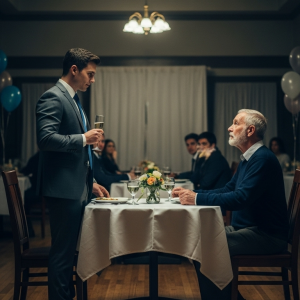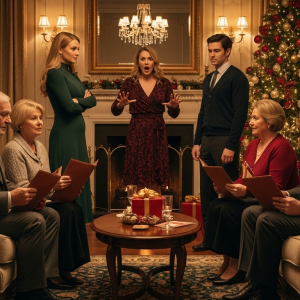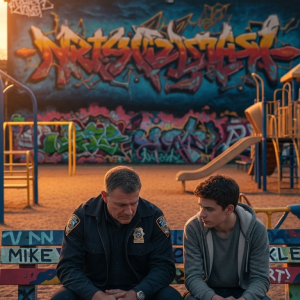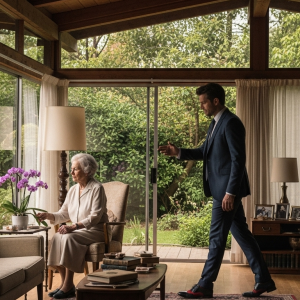The war began not with a bang, but with a whisper of silk. Chloe stood in front of a three-way mirror, bathed in the soft glow of the bridal boutique. The dress was a masterpiece of classic design, simple, elegant, and powerful—much like Chloe herself.
“It’s… acceptable,” a voice cut through the air, sharp and precise. Margaret, her future mother-in-law, circled her like a shark assessing its prey. “Though perhaps a bit plain, dear. We wouldn’t want people to think we were on a budget.”
Alex, her fiancé, quickly stepped in, placing a placating hand on his mother’s arm. “Mom, she looks beautiful. Like an angel.” He smiled at Chloe, a handsome, earnest smile that had once made her heart flutter. Now, it just looked weak.
This was the rhythm of their wedding planning. Chloe would make a choice, Margaret would undermine it with a perfectly crafted insult disguised as concern, and Alex would attempt to smooth things over, asking Chloe to “just concede this one point for the sake of peace.”
From the guest list to the color of the napkins, Margaret had waged a campaign of relentless control. She dismissed Chloe’s choices as “tacky” or “lacking in sophistication.” To the matriarch of the wealthy Sterling family, Chloe was an outsider with questionable taste, despite being a highly successful, self-made woman.
Chloe had kept the true scale of her success a closely guarded secret. To the Sterlings, she “worked in the restaurant industry,” a vague description that allowed them to imagine her as a mid-level manager, not the founder and CEO of Neptune’s Catch, the most successful chain of upscale seafood restaurants in the state. She knew Margaret would see her success not as an accomplishment, but as a threat.
The breaking point came three days before the wedding. Chloe was in her sleek, minimalist office overlooking the city when her phone buzzed. It was Damian, the head of her catering division and the manager of her flagship restaurant.
“Chloe, I’m sorry to bother you,” he began, his voice strained. “But we have a problem with the Sterling wedding catering.”
Chloe’s back stiffened. “Let me guess. Margaret Sterling?”
“She’s been calling nonstop for two days,” Damian vented. “First, she said the chosen menu was ‘common.’ Then she insisted we add caviar and champagne that weren’t in the budget. And just now, she sent this…” He forwarded an email.
Chloe opened the attachment. It was a doctor’s note, supposedly from a prominent allergist, stating in stark medical terms that the bride, Chloe, had a life-threatening allergy to all forms of shellfish. The diagnosis was severe, citing anaphylactic shock as a near certainty upon exposure.
“She told me,” Damian said, his voice dripping with disbelief, “that she was ‘looking out for your health’ and that if we served any shellfish, and you were harmed, she would hold us personally liable and ruin our company. She threatened to ‘call the owner’ if I didn’t comply.”
Chloe felt a cold, crystalline calm settle over her. The lies. The audacity. The sheer, naked attempt to seize control by faking a medical emergency. She looked at the forged doctor’s note. Margaret had finally overplayed her hand.
“Don’t change a thing, Damian,” Chloe said, her voice like ice. “Prepare the exact menu I selected. And please, have a copy of that doctor’s note ready for me. I’ll handle Mrs. Sterling personally.”
That evening, she gave Alex one last chance. She sat him down in their shared apartment, the city lights twinkling below.
“Alex, your mother called my catering company today,” she said calmly. “She told them I have a deadly shellfish allergy and demanded they change the entire menu.”
Alex sighed, rubbing his temples. “Oh, Chloe, you know how she is. She gets carried away. She probably just read an article somewhere and got worried. You know my mom, she only means well.”
“She forged a doctor’s note, Alex,” Chloe said, her eyes boring into his. “She lied. This isn’t ‘meaning well.’ This is a calculated act of sabotage. I need you to stand with me on this. I need you to tell her she has crossed a line.”
He shifted uncomfortably. “Can’t we just… change one or two dishes? Just to make her happy? It’s only for one night. It’s better than starting a huge fight right before the wedding. Please, honey, just let it go. For me.”

In that moment, Chloe saw her future flash before her eyes: a lifetime of being told to “let it go,” of being asked to shrink herself to accommodate his mother’s ego, of having a husband who would always choose peace over her own dignity. The decision, which had been forming for days, solidified into an unbreakable resolve. She would not let it go. She would end it.
The day of the wedding arrived, a perfect, sun-drenched Saturday. The cathedral was breathtaking, filled with hundreds of guests in their finest attire and an obscene number of white roses—Margaret’s choice, of course.
As Chloe walked down the aisle on her father’s arm, she was the very picture of a serene, beautiful bride. But beneath the veil, her eyes were not filled with romantic dreams. They were filled with the steely focus of a CEO about to liquidate a failed asset.
She saw the guests, friends, and family who had come to celebrate a union. She saw Margaret in the front row, preening in a lavender dress, a triumphant smirk on her face. And she saw Alex at the altar, looking nervous but deeply in love, completely oblivious to the verdict that was about to be delivered.
The ceremony began. The music swelled. The priest’s words about love and devotion washed over the silent, reverent crowd. Chloe and Alex held hands, their fingers intertwined. His were warm and slightly clammy. Hers were steady and cool.
They reached the pivotal moment. The priest smiled warmly. “And now, in the presence of God and this congregation, I ask: if there is anyone here who knows any reason why these two people should not be joined in holy matrimony, speak now, or forever hold your peace.”
A traditional, pregnant pause filled the cathedral. The air was still. The guests held their breath.
And then, a clear, feminine hand was raised. The bride’s hand.
Chloe lifted her hand, and in the cavernous silence, her voice rang out, not with emotion, but with chilling authority. “I do.”
A collective gasp swept through the church. Heads turned. People whispered in shock. Alex’s face crumpled in utter confusion, his eyes wide with disbelief. “Chloe? What are you doing? This is some kind of joke, right?”
She didn’t look at him. She let go of his hand and turned her body to face the front pew, her eyes locking directly onto her mother-in-law’s. The triumphant smirk on Margaret’s face had frozen, replaced by a mask of horrified confusion.
“I have an objection,” Chloe announced, her voice amplified by the microphone on the priest’s lectern. “It seems a critical piece of medical information has recently come to light, and I believe it must be addressed before we can proceed.”
She took a deliberate step forward. “Margaret,” she said, her tone polite but lethal. “Could you please confirm for everyone here? Did you, or did you not, contact my wedding caterer and inform them that I suffer from a severe, life-threatening allergy to shellfish?”
All color drained from Margaret’s face. She was trapped, exposed in front of everyone she had sought to impress. Cornered, she could only stammer, “I… I was just concerned for your well-being…”
“So you admit it,” Chloe pressed. “You sent them a doctor’s note detailing this condition, warning them that serving me seafood could be fatal?”
Margaret, trembling, gave a slight, almost imperceptible nod. That was all Chloe needed.
She turned back to address the stunned audience. “For those of you who don’t know me well,” she began, her voice resonating with newfound power, “I have spent the last ten years of my life building a business from the ground up. That business is the Neptune’s Catch restaurant group.”
The revelation sent another shockwave through the room. Whispers of “Neptune’s Catch?” and “She owns it?” rippled through the pews. Margaret’s face contorted as if she had been slapped.
“The entire reception feast for tonight was to be a gift from me, from my company, to my new husband and family,” Chloe continued, her gaze sweeping over the crowd before landing back on Margaret. “A celebration of the best seafood our coast has to offer.”
She paused, letting the weight of her words sink in. “However, given my sudden and catastrophic ‘allergy,’ as diagnosed by a concerned third party, I cannot in good conscience put my own health at risk. The food prepared by my own company is apparently no longer safe for me to consume.”
She turned to Alex, whose face was a tragic mask of dawning horror. “Therefore,” Chloe declared, her voice final and absolute, “I am canceling the catering contract, effective immediately. There will be no reception.”
She looked from Alex to his mother, a final, pitying glance. “And consequently, there will be no wedding. This marriage is over.”
With a grace that was almost unnerving, she took her magnificent bouquet of flowers and gently placed it into Alex’s numb, trembling hands. She gave her father a reassuring squeeze on the arm, turned her back on the altar, and, alone, walked back down the aisle, her head held high, not as a jilted bride, but as a queen abdicating a throne that was never worthy of her.
The silence she left in her wake lasted only a moment before erupting into utter chaos. Margaret began to sob, not from sadness, but from the unbearable agony of total, public humiliation. Alex stood paralyzed at the altar, clutching the useless bouquet, his perfect wedding day and his entire future dismantled in less than two minutes.
The story of the “Neptune’s Catch Verdict” became an instant city legend. Margaret Sterling became a social pariah, a cautionary tale of a controlling mother-in-law whose schemes had backfired in the most spectacular fashion imaginable. The family’s reputation was irrevocably tarnished, not by scandal, but by hubris.
Chloe, however, emerged not as a victim, but as an icon. She hadn’t lost a husband; she had dodged a bullet, extricating herself from a toxic family with surgical precision. Her story was one of empowerment, of a woman who chose self-respect over a diamond ring. In a strange twist of fate, the publicity was phenomenal. Neptune’s Catch saw a surge in business, as people flocked to support the woman who refused to be silenced.
Two years later, Chloe met a man who was her true equal. He was an architect who loved her fierce independence and celebrated her success as if it were his own. He laughed when she told him the story of her first wedding, admiring her courage.
Their wedding was the opposite of her first. It was a small, intimate ceremony on a private beach at sunset, attended by only their closest friends and family. The reception was a glorious, informal feast of lobster, oysters, and grilled fish, all prepared by Chloe and her team.
As she stood with her new husband, raising a glass of champagne with the waves crashing at their feet, she felt a profound sense of peace. She had learned that the most important vow a person could make was not to a partner, but to themselves: to never allow anyone to make them feel small, to never compromise their own worth, and to always, always trust their own catch.
The years that followed the “wedding that wasn’t” were kind to Chloe. Her decisive action at the altar had, paradoxically, become the greatest marketing campaign she could have ever conceived. Neptune’s Catch was no longer just a restaurant chain; it was a brand synonymous with empowerment.
She was a business icon, a role model, a woman who had refused to have her worth negotiated. Her new husband, Michael, an architect with a quiet confidence that perfectly complemented her fire, championed her at every turn. He admired her strength, celebrated her successes, and loved the powerful, uncompromising woman she was.
Their life together was built on mutual respect, a calm harbor after a tumultuous sea. They were a team, in business and in life, often brainstorming expansion plans for her restaurants and blueprints for his buildings over dinner.
Three years after she had walked out of that cathedral, they found themselves at the prestigious National Restaurant Association Gala. Chloe, radiant in an emerald green gown, had just accepted the coveted “Restaurateur of the Year” award. Michael stood beside her, his eyes shining with pride.
“To the woman who knows the value of a fresh catch and a clean break,” he toasted her later at their table, clinking his champagne glass against hers. “I’m the luckiest man in the world.”
Chloe smiled, a genuine, unfettered smile. “We’re a good team,” she said, leaning her head on his shoulder. It was true. Life was good. The past was a distant, almost forgotten story.
But the past, she was about to discover, wasn’t quite finished with her yet. As she scanned the glittering crowd, her eyes caught on a familiar figure standing alone near the terrace doors. He was thinner, his posture less confident than she remembered. The expensive, tailored suit he wore seemed to hang off him, a costume from a life he no longer lived. It was Alex.
A jolt, not of fear or anger, but of surprise, went through her. She hadn’t seen or heard from him since that day. Michael felt her tense up and followed her gaze. “Is that…?” he asked, his voice low and protective.
“Yes,” she breathed. “I’m okay. I’m just surprised to see him here.”
As if feeling her stare, Alex looked up and their eyes met across the crowded ballroom. A complex mix of emotions crossed his face: shame, regret, and a hint of trepidation. After a moment’s hesitation, he began to make his way through the tables, moving towards them.
Michael instinctively put a reassuring hand on the small of her back. “Do you want to leave?” he asked.
“No,” Chloe said, her voice regaining its familiar steadiness. “It’s alright. Let’s just see what he wants.”
Alex stopped a respectful distance from their table, his hands clasped awkwardly in front of him. He looked from Michael to Chloe, his eyes filled with a humility she had never seen in him before.
“Chloe,” he began, his voice quiet and hoarse. “Congratulations on the award. You deserve it. You deserve everything.”
“Thank you, Alex,” she replied, her tone neutral, polite. “This is my husband, Michael.”
Alex nodded at Michael, offering a small, sad smile. “I know. I’m happy for you, Chloe. Truly. I just… if I could have one minute? I know I have no right to ask.”
Chloe glanced at Michael, who gave a subtle nod of assent. “One minute,” she agreed.
Alex took a deep breath, the words seeming to catch in his throat. “I never apologized,” he said, the admission costing him dearly. “For that day, and for all the days before it. I was a coward. I let my mother’s voice be louder than my own conscience, and I asked you to make yourself smaller so I wouldn’t have to be brave.”
He finally looked her straight in the eye. “You did the right thing. Walking out was the strongest, bravest thing I’ve ever seen. You didn’t just save yourself, Chloe. In a strange way, you saved me too.”
Chloe listened, her expression unreadable. This was not the weak, placating Alex she had left at the altar. This was a man who had clearly been through a crucible and come out changed.
“What do you mean, it saved you?” she asked, her curiosity piqued.
“The humiliation of that day was… absolute,” he confessed, not with self-pity, but with a sense of clarity. “For both of us. After the guests left and the shock wore off, I finally saw her. Not as my mother, but as a manipulator who had destroyed my life out of a pathetic need for control.”
He continued, “We had a fight that day, our first and last real one. I told her that every ounce of the blame was hers. That she had never seen you, only an extension of herself she couldn’t control. I packed my bags that night and I left. I haven’t spoken to her since.”
The revelation was more shocking than his apology. Alex, the dutiful son, had finally cut the cord.
“She didn’t handle it well,” he said, his voice devoid of emotion. “When her own son cut her off, the social shunning became absolute. Her friends, her charities… they all faded away. She lost her power, and she had nothing else. She lives in that big house alone now. A queen in an empty castle.”
The image was a stark and fitting end for the woman who had tried to ruin her. The “destruction” was complete, not by Chloe’s hand, but by the natural consequences of her own toxicity.
“I had to start over,” Alex finished. “New job, new city, a lot of therapy. I had to learn how to be a man without my mother pulling the strings. I’m not asking for your forgiveness. I don’t deserve it. I just wanted to say thank you. And that I’m sorry.”
Chloe considered him for a long moment. The anger she had once felt was long gone, replaced by a distant pity. He was right. She had freed them both.
“I accept your apology, Alex,” she said, and she meant it. “I hope you find happiness.”
With a final, grateful nod, he turned and walked away, disappearing back into the crowd. He was no longer a ghost haunting her past, but just a man she used to know. Chloe turned back to her husband, took his hand, and felt a final, peaceful chapter close. Her past was settled, her present was beautiful, and her future was brighter than ever.




